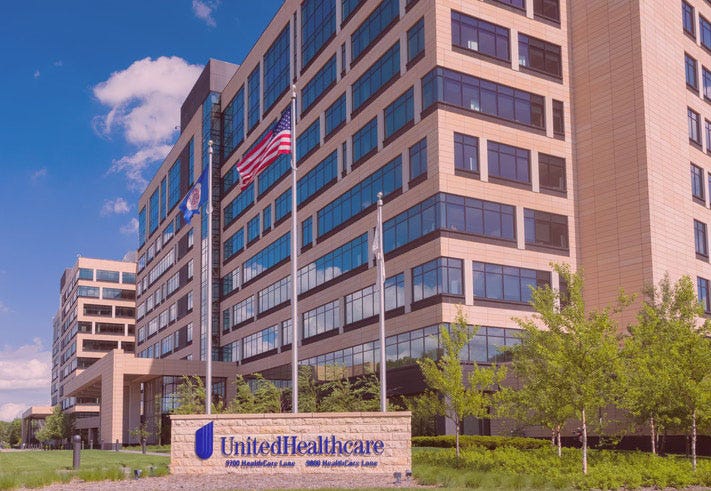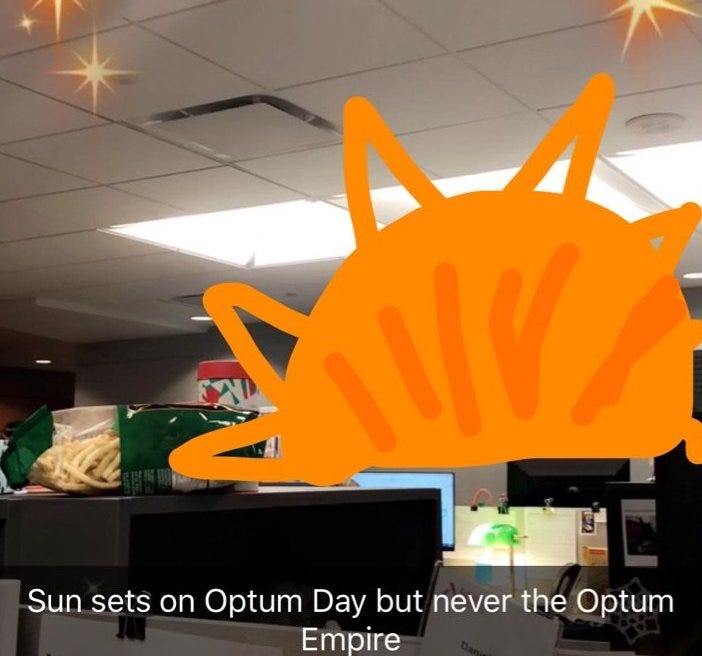The sun never sets on the UnitedHealth empire
Or: UnitedHealth is actively dominating the system and harming patient care
This week, UnitedHealth Group announced two big acquisitions: Change Healthcare and Atrius Health. These are far from the first acquisitions UHG has pursued.
Actually, its strategy of acquiring disparate pieces of the medical system seems to be its only strategy. UHG certainly isn’t known for a relentless patient focus or the pursuit of unparalleled quality. UHG has been accused of overbilling Medicare, backdating stock options, for not adhering to mental health parity rules, and skewing patient reimbursement rates. They also used one of their acquired research firms to help sink the public option provision of the Affordable Care Act.
In 2019, a judge recused himself from a case accusing UHG of denying coverage for a well-known treatment, noting in his legal filing that the judge himself had been denied coverage for a similar procedure. In the filing, the judge called UHG’s denial “immoral and barbaric.”
The empire
First, a list of UHG’s more notable acquisitions. This isn’t even all of them, I just want to show how many different areas they’re in:
Logistics Health, Inc. (2011)
Audax Health (2014)
Catamaran (a pharmacy benefit manager) (2015)
Rally Health (2017)
Advisory Board Company (2017)
Reliant Medical Group (2018)
DaVita Medical Group (2019)
This is an incomplete picture of their scale, though. All of these acquisitions gave UHG (large) chunks of different parts of the health care system—dialysis, direct patient care, data & analytics. But the corporation’s biggest area of dominance is in health insurance. UnitedHealthcare, the insurance arm, has all of these subsidiaries: (I know it’s unreadable, but most of the names are boring, usually state-based entities you haven’t heard of—this map is just for the effect of sheer, unbelievable size)
Here’s a more easily read chart of their structure. This might not directly correspond to their org chart, which is obviously not public, but it overlaps closely.
Here is where I should note that I, too, was once acquired by UnitedHealth Group. Not to insert an Orwell reference into a week that’s already included too many (inaccurate) Orwell references, but as I was being onboarded for UHG, the guy in charge of reassuring us anxious employees literally kept telling us that, together, we could have an outsized influence. Or in his parlance, “2 + 2 = 5".
A coworker’s snapchat as we were being acquired
It will be Biden’s FTC and DOJ that review these acquisitions. I think the FTC and DOJ should not allow them to proceed. Some of this newsletter’s readers might not agree, so this post is more or less my argument for why the acquisitions should be blocked. Hit the comment button if you disagree—I feel quite strongly about this for both health care innovation and the future of the system more broadly, so I’m interested to hear opposite opinions.
First, the obvious. UHG doesn’t need more payment platforms or more physicians directly working for it. It’s already got OptumPay (more on that later), and more than 53,000 physicians. Instead of being motivated by need or patient-focused business strategy, these acquisitions appear to be all about UHG gaining dominance against CVS by vacuuming up more pieces of the health care industry. Notably, few (if any?) of UHG’s acquisitions have resulted in noticeable increased “efficiency” or “lower prices” for patients.
Now, the specifics:
Change Healthcare
I actually wrote about Change last October, prior to this acquisition announcement. They’re one of the largest physician reimbursement entities in the U.S. (meaning they’re a middleman between insurers and physicians), a position they’ve achieved by rolling up at least 13 acquisitions in the last 11 years. They’re part-owned by Blackstone, a private equity firm, and part-owned by McKesson, an enormous GPO.
While public details are scarce, it appears that Change makes a significant portion of its revenue by sending reimbursements to physicians in the form of prepaid cards—with a processing fee attached. To use the prepaid card, the physician must accept a reimbursement that’s, say, 2% lower. But it’s not much of a choice. If a physician wants their full reimbursement, without paying the fee, they have to individually brave the bureaucracy and request a paper check, which may not arrive for months.
The payment contracts can get even more complicated. For example, Echo, another payment processing corporation, recently debuted “Red Carpet Provider Services,” for which it charges 1.99% per payment, according to a contract I recently saw. (The “red carpet” is not optional.)
Payment processing corporations assert their dominance over physicians by demanding more documentation—more proof that the codes align with the procedure performed—and they may demand this for every procedure performed. The more dominant the corporation, the more they can demand of the physician—and the less recourse the physician has.
UnitedHealth already offers its own payment processing service, OptumPay. So when the corporation announced last week its intention to acquire Change for around $13 billion, it became apparent that they’re just trying to roll-up the space. I can’t imagine this will increase efficiency—only increase the percentage that UnitedHealth can skim off the top for offering the service.
(Also, the part I just can’t get over: insurers are already responsible for sending reimbursements to physicians, so this is just a circular way of returning more money to the insurer by…adding another middleman and thereby decreasing efficiency.)
If Biden’s FTC approves this merger, they’re inviting decades more of rising health care costs, revenue pulled out of patients’ and physicians’ wallets.
Atrius Health
My fear with the Atrius physician group acquisition is that previous UHG/Optum acquisitions of provider practices seem to have had negative effects on patients.
In 2018, Optum acquired Reliant Health, a physician group centered in Worcester, Massachusetts. Reliant is a large practice, with more than 500 physicians. The Atrius acquisition would bring in another 715 physicians, based in Newton, Massachusetts.
In 2019 I heard from a physician in Massachusetts, who told me that, because they were not associated with Optum, Optum kept them from seeing patients, even though this physician was an essential specialist for Optum patients and Optum did not have enough specialist capacity on its own. The story was one of Optum’s power, but also that Optum prioritized retaining that power over the wellbeing of its patients.
I’m not a journalist, and I have no way to verify this physician’s story. But I think it’s remarkable that they got in touch with me nearly two years ago, before UHG began trying to further expand its presence in Massachusetts.
Further, Eastern Massachusetts is already dominated by a few large players, including Massachusetts General Hospital and Partners Healthcare-affiliated facilities. Adding Optum and its newly acquired hundreds of physicians to this list only serves to decrease patient choice further.
Conclusion
UnitedHealth is already too big. As a coworker noted while we were being acquired—adapted for the title of this post—“the sun never sets on the Optum empire.”
I think there’s a world in which, without any government action on the insurance coverage front, health insurance in the U.S. has to become a regulated oligopoly, a banal but affordable annoyance on the level of the neighborhood electric company. But UnitedHealth is trying to achieve scale without regulator oversight or genuine patient care improvements—a failure that falls squarely on the regulators.
If nothing else, COVID-19 has shown us the cracks in the health care system—the solution can’t be continuing with the program of the same old gigantic corporations giving us the same old lines about improvement. For physicians and patients, lip service about “efficiency” is just so obviously inadequate as prices continue to rise, minority communities continue to be inequitably decimated by disease, and CVS can’t figure out vaccine distribution.
Allowing these acquisitions to go through unacceptably decreases the amount of control that physicians and patients have over their bills and their treatment. Government regulators need to stop them.






Thanks for the excellent article. You are absolutely spot on. The goal of Optum/UHC is to "become too big to fail" i.e. too big to be regulated. They rely on the scale and size and control being the largest private health insurer in the country, while at the same time leveraging public money through Medicare Advantage plans to spend less on care and regularly increase their profit margins.
Their purpose is multifold, using Optum scale in owning medical practices across multiple states which focus on the Medicare Advantage market. Optum receives increasing revenue from Medicare Advantage while trying to reduce spend on the members in the name of quality, denial of care, to increase their profit margin.
Optum regularly uses pressure to each individual care subsidiary to buy the products of its other subsidiaries.
State regulators, Congress, FTC should be doing their jobs by examining the clear conflict of interest that is there when a payor and provider are both owned by the same entity and every dollar "saved" by the providing entity (Optum) simply relates to increased profit margin for the payor (UHG).
Their growth and control over health care should worry all involved.
Atrius is an extremely well run and well considered multispeciality group practice and accountable care organization with relationships with Tufts and Blue Cross/Blue Shield. It is doubtful that Optum can improve on Atrius. Atrius's motivation is most likely financial due to Covid. Acquisition by Optum could disrupt the Massachusetts market if Atrius then becomes an exclusive UnitedHealth provider. We need to know a lot more about this.